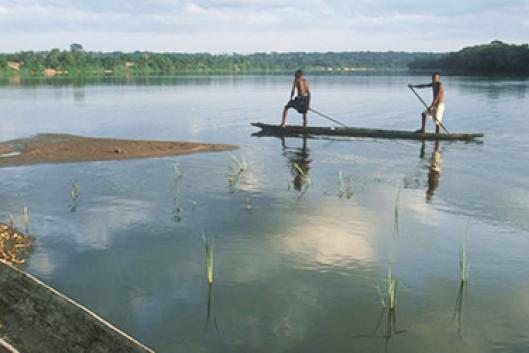The Congo Basin in Central Africa contains the second largest forest in the world. Its extensive territory is shared by six countries: the Democratic Republic of Congo, the Republic of Congo, Gabon, Cameroon, the Central African Republic, and Equatorial Guinea. With this Bulletin we seek to explore in depth and report on the intense land-grabbing that people are confronted with and resist in this region—a forested area that houses and provides the livelihood and sustenance for around 30 million people.
This Bulletin is the result of the WRM Secretariat's decision to focus some of its issues on regions, rather than thematically. Bulletin readers suggested this as a way to share information and delve more deeply into what is happening in some regions that are important due to their forests. We also hope that this Bulletin focused on the Congo Basin and collectively put together with organizations and activists based in the region, contributes to the dissemination of a broader view at what is happening in this area.
Indeed, a Bulletin focused on the Congo Basin is critically needed. The region is suffering from a new wave of colonialism. Land grabbing, while not new to the area, intensified after the financial crisis and sharp rise in food prices in 2007-2008. This situation, along with the relative calm that several countries in the region are experiencing after years of civil war and unrest—particularly in the Democratic Republic of the Congo (DRC)—has led to the promotion of foreign investment. The result will be more large-scale deforestation and the concentration of territorial control in few hands, with new investments in monoculture plantations, energy and infrastructure. This will especially affect the people who live in and depend on forests.
One article in this newsletter reflects on how international and regional forest policies have failed to achieve their own objectives, due to the fact that such instruments do not seek to implement deep and necessary changes. Yet, the issue of land ownership is at the center of the debate in the Congo Basin; therefore one article specifically focuses on the importance of access and rights to land for women in Africa, who are responsible for 60% of food production. Another article shares reflections from a regional meeting where participants identified tactics oil palm companies use when confronting local resistance in their drive to expand their monoculture on communal lands. One article therefore explores agribusiness investment projects—like mega agroindustrial parks in the DRC—that undermine small-scale farming. Another article, on Cameroon, explores the true impacts of infrastructure, transport and energy projects. A final article of this Bulletin reflects on the failure of how protected areas in the Congo Basin have been established using “guards-and-guns” governance, which closed off large areas from access by local populations. For example in the Republic of Congo and in the DRC, planned large-scale REDD+ projects would partially encompass a national park and a reserve, respectively. Both projects contain regulations that could actually end up further dispossessing forest peoples
REDD+ type projects have begun to multiply concurrently throughout the region. The Congo Basin still has large preserved areas of forest, thanks to the communities who have traditionally lived there. However, the proliferation of “conservation” parks and projects like REDD+ have not impeded the continued increase in plans to expand oil palm and other monoculture plantations. Not only do REDD+ and similar projects allow for ongoing forest destruction and degradation, they also threaten the rights of communities who use, control and access their forests.
The impacts of this new wave of colonialism are clearly visible in this region. When looking at how land-grabbing is expanding—and thus the grabbing of forests, water, cultures and life—one can observe a foreign, predatory, extractive, and industrial model that sees forests like the Congo Basin as “resources” that can be quantified, extracted, controlled, bought and sold.
In this context, this Bulletin attempts to stress that the consequence of these extractive activities and the land-grabbing that facilitate them is the almost always violent expulsion of families, communities and peoples; the destruction of cultures, social fabrics, forest-based traditions and diverse identities; the loss of autonomy and territorial control by communities who have lived in the forests of the Congo Basin for countless generations.
